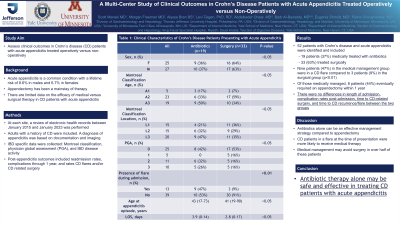Tuesday Poster Session
Category: IBD
P3555 - A Multi-Center Study of Clinical Outcomes in Crohn’s Disease Patients With Acute Appendicitis Treated Operatively vs Non-Operatively
Tuesday, October 24, 2023
10:30 AM - 4:00 PM PT
Location: Exhibit Hall

Has Audio

Scott Manski, MD
Thomas Jefferson University Hospital
Philadelphia, PA
Presenting Author(s)
Scott Manski, MD1, Morgan Freeman, MD2, Alyssa M. Bren, BS2, Levi Teigen, PhD, RD2, Abdelkader Chaar, MD3, Badr Al-Bawardy, MD4, Eugenia Shmidt, MD2, Raina Shivashankar, MD, FACG1
1Thomas Jefferson University Hospital, Philadelphia, PA; 2University of Minnesota, Minneapolis, MN; 3Yale University School of Medicine, New Haven, CT; 4King Faisal Specialist Hospital and Research Center, Riyadh, Ar Riyad, Saudi Arabia
Introduction: There are limited data on the efficacy of medical versus surgical therapy in Crohn’s disease (CD) patients presenting with acute appendicitis. We have previously presented data in a small cohort of CD patients showing that medical therapy for acute appendicitis may be a safe and effective option compared to surgical therapy (Am J Gastro. 117(10S):e761. 2022). In this study, we sought to assess the outcomes of CD patients treated with non-operative versus operative strategies for acute appendicitis in a larger multi-center cohort.
Methods: A multi-center retrospective review of electronic health records between 1/1/2015 and 1/31/2023 was conducted. Adult patients with a documented history of CD presenting with acute appendicitis were included. Patient demographics and inflammatory bowel disease history were collected. Clinical assessments, radiographic data, and medical and/or surgical interventions at the time of presentation for appendicitis were documented. T-tests were used to compare continuous variables and Chi-Square or Fisher’s exact tests were used to compare categorical variables.
Results: A total of 52 patients with CD and acute appendicitis were identified (19 were treated medically with antibiotics and 33 underwent surgery). Fifty-two percent of patients were male. Demographic data including sex, age at CD diagnosis, and CD location were similar between surgical and medical management groups (Table 1). Crohn’s disease activity, derived from a physician global assessment (PGA) score, was similar in both groups. At the time of admission, 9 patients (47%) in the medical management group were in a CD flare vs. 3 patients (9%) in the surgical group (p< 0.01). Of those medically managed, 8 patients (44%) eventually required an appendectomy within 1 year. There were no differences in length of hospital stay, complication rate up to 6 months post-admission, time to subsequent CD-related surgery, and time to CD recurrence/flare between the two groups.
Discussion: In this multi-center cohort of CD patients presenting with acute appendicitis, we found similar outcomes between those who were managed surgically versus medically. CD patients in a flare at the time of presentation were more likely to receive medical therapy. Therefore, antibiotic therapy may be an effective and safe management strategy in the treatment of CD patients with acute appendicitis. Medical management may avoid surgery in over half of these patients.
Disclosures:
Scott Manski, MD1, Morgan Freeman, MD2, Alyssa M. Bren, BS2, Levi Teigen, PhD, RD2, Abdelkader Chaar, MD3, Badr Al-Bawardy, MD4, Eugenia Shmidt, MD2, Raina Shivashankar, MD, FACG1. P3555 - A Multi-Center Study of Clinical Outcomes in Crohn’s Disease Patients With Acute Appendicitis Treated Operatively vs Non-Operatively, ACG 2023 Annual Scientific Meeting Abstracts. Vancouver, BC, Canada: American College of Gastroenterology.
1Thomas Jefferson University Hospital, Philadelphia, PA; 2University of Minnesota, Minneapolis, MN; 3Yale University School of Medicine, New Haven, CT; 4King Faisal Specialist Hospital and Research Center, Riyadh, Ar Riyad, Saudi Arabia
Introduction: There are limited data on the efficacy of medical versus surgical therapy in Crohn’s disease (CD) patients presenting with acute appendicitis. We have previously presented data in a small cohort of CD patients showing that medical therapy for acute appendicitis may be a safe and effective option compared to surgical therapy (Am J Gastro. 117(10S):e761. 2022). In this study, we sought to assess the outcomes of CD patients treated with non-operative versus operative strategies for acute appendicitis in a larger multi-center cohort.
Methods: A multi-center retrospective review of electronic health records between 1/1/2015 and 1/31/2023 was conducted. Adult patients with a documented history of CD presenting with acute appendicitis were included. Patient demographics and inflammatory bowel disease history were collected. Clinical assessments, radiographic data, and medical and/or surgical interventions at the time of presentation for appendicitis were documented. T-tests were used to compare continuous variables and Chi-Square or Fisher’s exact tests were used to compare categorical variables.
Results: A total of 52 patients with CD and acute appendicitis were identified (19 were treated medically with antibiotics and 33 underwent surgery). Fifty-two percent of patients were male. Demographic data including sex, age at CD diagnosis, and CD location were similar between surgical and medical management groups (Table 1). Crohn’s disease activity, derived from a physician global assessment (PGA) score, was similar in both groups. At the time of admission, 9 patients (47%) in the medical management group were in a CD flare vs. 3 patients (9%) in the surgical group (p< 0.01). Of those medically managed, 8 patients (44%) eventually required an appendectomy within 1 year. There were no differences in length of hospital stay, complication rate up to 6 months post-admission, time to subsequent CD-related surgery, and time to CD recurrence/flare between the two groups.
Discussion: In this multi-center cohort of CD patients presenting with acute appendicitis, we found similar outcomes between those who were managed surgically versus medically. CD patients in a flare at the time of presentation were more likely to receive medical therapy. Therefore, antibiotic therapy may be an effective and safe management strategy in the treatment of CD patients with acute appendicitis. Medical management may avoid surgery in over half of these patients.
Disclosures:
Scott Manski indicated no relevant financial relationships.
Morgan Freeman indicated no relevant financial relationships.
Alyssa Bren indicated no relevant financial relationships.
Levi Teigen indicated no relevant financial relationships.
Abdelkader Chaar indicated no relevant financial relationships.
Badr Al-Bawardy: AbbVie – Speakers Bureau. Bristol Myers Squibb – Advisor or Review Panel Member, Speakers Bureau. Pfizer – Advisor or Review Panel Member. Takeda – Speakers Bureau.
Eugenia Shmidt indicated no relevant financial relationships.
Raina Shivashankar: Abbvie – Grant/Research Support, Speakers Bureau. Bristol Meyers Squibb – Speakers Bureau. Janssen – Advisory Committee/Board Member, Grant/Research Support.
Scott Manski, MD1, Morgan Freeman, MD2, Alyssa M. Bren, BS2, Levi Teigen, PhD, RD2, Abdelkader Chaar, MD3, Badr Al-Bawardy, MD4, Eugenia Shmidt, MD2, Raina Shivashankar, MD, FACG1. P3555 - A Multi-Center Study of Clinical Outcomes in Crohn’s Disease Patients With Acute Appendicitis Treated Operatively vs Non-Operatively, ACG 2023 Annual Scientific Meeting Abstracts. Vancouver, BC, Canada: American College of Gastroenterology.
